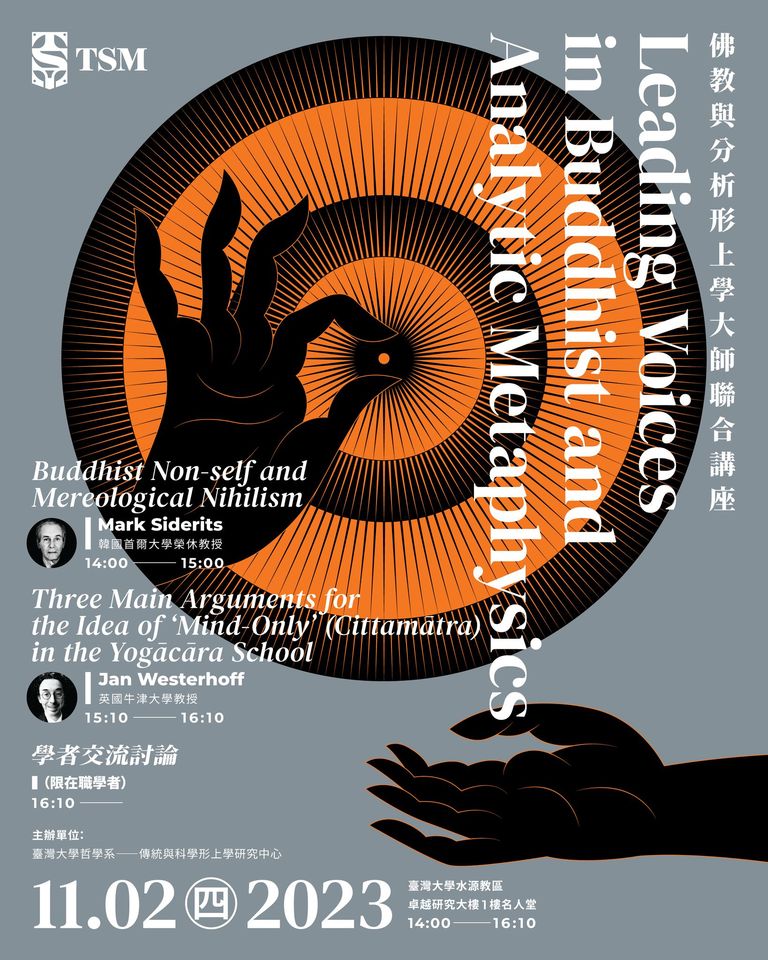[演講公告] 11/2 (四) 14:00-16:10 佛教與分析形上學大師聯合講座(Leading Voices in Buddhist and Analytic Metaphysics)

佛教與分析形上學大師聯合講座
Leading Voices in Buddhist and Analytic Metaphysics
日期:2023/11/2(四) 14:00-16:10
地點:台灣大學水源校區卓越大樓1樓名人堂演講廳
主辦單位:臺大傳統與科學形上學研究中心
在當今的歐美佛教哲學圈,如何精準地將擁有千年淵源的佛教哲學,以當代哲學的語言重新詮釋,並與現代思潮進行深入對話,已經成為一股不可忽視的風潮。有鑑於此,臺大傳統與科學形上學研究中心隆重邀請了兩位跨界且在佛教哲學與分析哲學領域都有卓越貢獻的學者,以兩場視野開闊的專題演講為我們展示這種前沿發展的範例。
Mark Siderits教授將探討佛教中的「無我論」,並從此論述中拓展到物質的層面。他將鋪陳如何通過分體論的虛無主義(mereological nihilism)來說明,從物質角度看來,所謂由更細微單元組成的整體在實際上並不存在。而Jan Westerhoff教授則會帶領我們深入唯識學派有關「一切唯識」的核心思想,詳細回顧世親、陳那和法稱等大師的論證,並重新審視這些論證是否足以支撐唯識學的核心主張。
--------------------------------------------
議程與演講摘要:
14:00-15:00 Speaker: Mark Siderits (Professor Emeritus, Seoul National University)
Title: Buddhist Non-self and Mereological Nihilism
Abstract: While it is well known that Buddhists deny the existence of a self, it is not always understood that this denial extends to the person. Not only do Buddhists deny that there is the sort of thinking substance that Descartes famously proclaimed, they also deny the existence of anything like a whole composed of the sorts of physical and psychological elements thought of as the constituents of a person. The latter denial is supported by an argument for mereological nihilism, the view that strictly speaking there are no composite entities. This argument, its highly counter-intuitive consequences, and efforts to mitigate those consequences will be examined with an eye toward overall assessment of the resulting position.
15:00-15:10 Tea Break
15:10-16:10 Speaker: Jan Westerhoff (Professor, University of Oxford)
Title: Three main arguments for the idea of 'mind-only' (cittamātra) in the Yogācāra school
Abstract: This talk investigates three important arguments for the key Yogācāra idea that everything is “merely mind,” associated with three central Yogācāra thinkers: Vasubandhu, Diṅnāga, and Dharmakīrti. I will explain each argument and try to assess the extent to which it is able to provide systematic support for the Yogācāra perspective.
16:10- Roundtable discussion (academics only)
